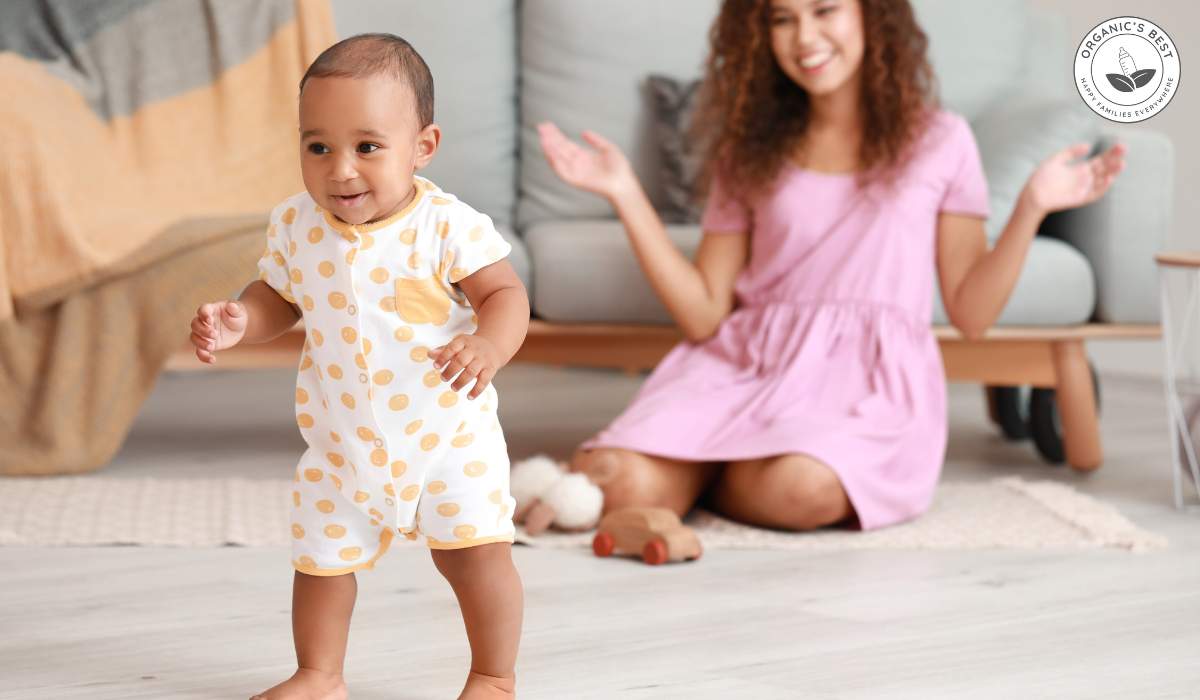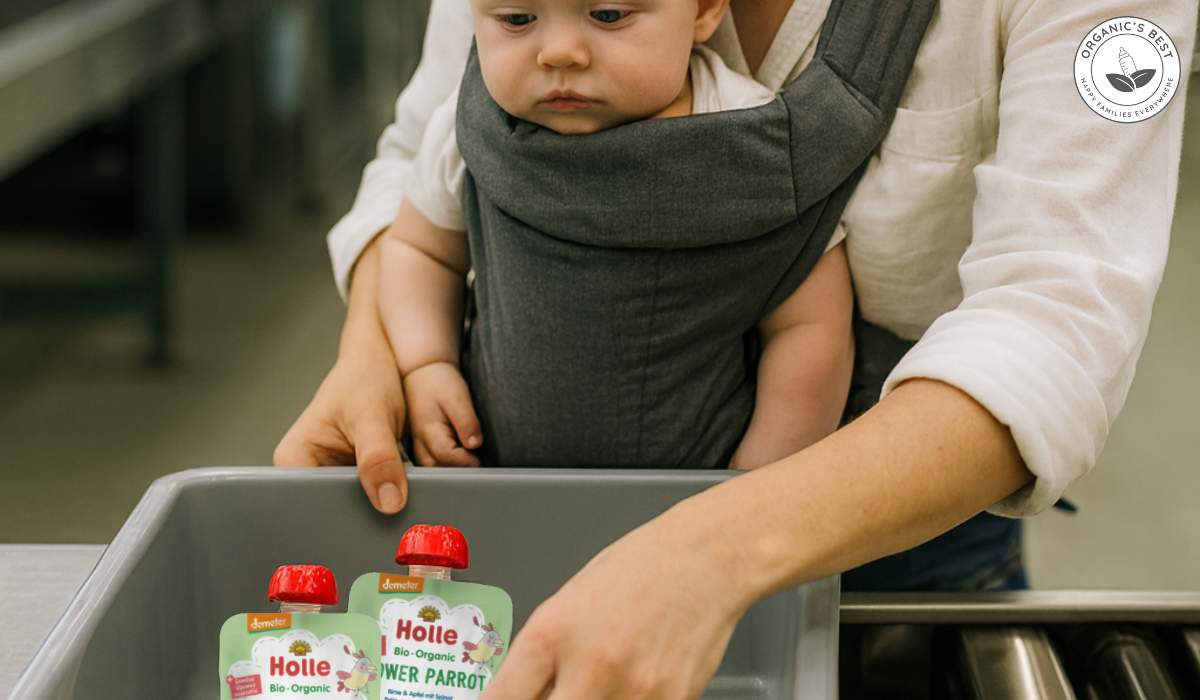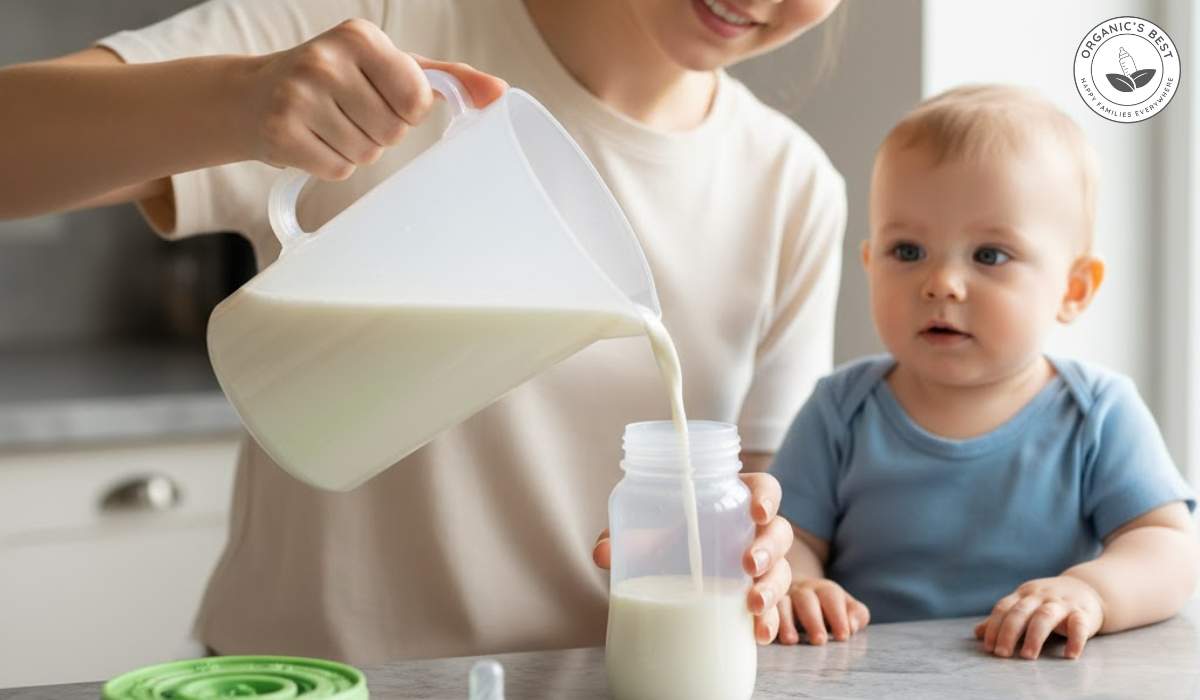Click to Get 2 FREE Boxes/Cans
Click to Get 2 FREE Boxes/Cans
Only New Customers! Click HERE to Get 2 Extra Boxes/Cans for Free With Your First Order.
Only New Customers! Click HERE to Get 2 Extra Boxes/Cans for Free With Your First Order.
BABY FORMULA
Offering new parents top-quality European infant formula from renowned brands like HiPP, Holle, Kendamil, and more. If you’re uncertain about which product to choose, our Formula Finder can help you make the best decision for your baby.
Baby Food
Offering new parents a premium selection of European baby foods, including jars, pouches, cereals, and snacks from esteemed brands like HiPP and Holle.
Baby First Steps: When Do Babies Start Walking?
by Agustina Fernandez October 01, 2025 8 min read

There's nothing quite like seeing your little one rise to their feet and wobble into those first steps. For many parents, it's one of the biggest moments of early childhood. It also signals the end of an era, because those sweet newborn days and easy-to-contain crawling sessions are now behind you.
Before you know it, you'll be chasing a determined little explorer who can cross the living room in mere seconds. While you may sometimes long for the days when you could set your baby down and know they'd stay put, this exciting milestone is worth the new level of vigilance it demands.
From a developmental perspective, your kid walking shouldn't come as a massive surprise, because it is the natural outcome of months of gradual physical progress. Long before that first wobbly step, your baby is strengthening core muscles during tummy time, pulling up on furniture to build leg power, and practicing balance with every small movement.
To help you prepare for your child walking, this article tackles common questions like when babies typically start walking, the signs your little one is getting ready to take those first steps, simple exercises that can help, and more, so you'll know what to expect and when it might be worth seeking extra support during this big milestone.
Table of Contents
- Average Age of Walking: When Do Babies Take Their First Step?
- Stages of Crawling to Walking
- Exciting News! Signs Baby Will Walk Soon
- How to Encourage Baby to Walk
- Key Factors That Determine When Your Child Will Take Their First Steps
- Conclusion: Embrace Your Baby's First Steps
- Answering Your Questions on Baby Walking
Average Age of Walking: When Do Babies Take Their First Step?

When it comes to your baby learning to walk, the biggest question on your mind is probably what age do babies start walking?
Most babies have their first walk around their first birthday, but what is considered to be "normal" is a pretty wide window. Some tiny go-getters take those first independent steps as early as 9 months, while others are perfectly healthy and happy to crawl until 16 or even 17 months. Pediatricians generally agree that the average walking age is 12 months, but anywhere between 9 and 18 months is relatively normal.
In that regard, if your child isn't walking by 18 months, it's probably a good idea to check in with your pediatrician. Often, late walkers simply need a little more time or practice, but an evaluation can rule out any underlying issues and provide some peace of mind if you're anxiously awaiting those first steps.
Remember, while it is important to track development, each baby is on their own timeline, and a first birthday without walking is rarely a red flag.
Stages of Crawling to Walking
Learning to walk isn't something that happens overnight; it is a gradual process that starts months before those first independent steps.
While every baby follows their own path, with some even skipping certain phases, the progression from crawling to walking generally moves through a series of key stages, and you should be able to spot signs baby will walk soon.

Pulling Up to Stand
Around 8 to 10 months, many babies begin pulling themselves upright using furniture or a parent's hands. This strengthens their legs and teaches them how to shift their weight, building the groundwork for balance and coordination.
Cruising
Once standing feels steadier, babies often start "cruising," or moving sideways while holding onto furniture for support. This stage is all about practicing balance, building hip strength, and learning how to move their feet in a coordinated way.
Standing Unassisted
After a few weeks of holding on, babies will be confident enough to experiment with letting go. They might stand on their own for just a few seconds at first, wobbling slightly as their core and leg muscles work together to keep them upright.
First Steps
Finally comes the big moment, a step or two without support, usually between 12 and 15 months, though anything up to 18 months can still be perfectly normal. Early steps are often wide and unsteady, but confidence will build quickly as their balance improves.
Exciting News! Signs Baby Will Walk Soon
Walking rarely comes as a total surprise. In the weeks leading up to those first independent steps, most babies give hints that they're getting close.
You might notice longer stretches of standing without holding on, or a sudden fascination with moving along furniture. These are all signs of baby learning to walk and an indication that your baby's muscles and balance are ready for the next challenge!
Pulling up to stand is usually one of the earliest stages of walking baby. From there, cruising shows that your little one is experimenting with weight shifts and foot placement. Eventually, you'll catch them standing completely on their own.
Some parents also notice a short sleep regression around the one-year mark, which can be linked to big developmental leaps like walking. If your baby is trying new movements or showing extra determination to practice, those first steps are likely just around the corner.
How to Encourage Baby to Walk
You can't make your baby walk before they're ready, but you can create the right conditions for them to practice the skills that lead to those first steps.
If you're wondering how to help baby walk, the goal should be to give them freedom to move, safe places to explore, and gentle support as their balance and confidence grow.

Here are some simple tips for how to teach baby to walk:
-
Give Plenty of Floor Time: Let your baby play on the floor every day, outside of the stroller, carrier, or swing. Open space encourages pulling up, cruising, and taking those first steps.
-
Create a Safe Practice Zone: Set up a clutter-free area where your baby can move around without sharp corners or tripping hazards. Low, sturdy furniture is perfect for cruising practice.
-
Offer Hands-On Support: Hold your baby's hands while they take a few steps, or kneel in front of them and encourage them to walk toward you. Short, fun "practice walks" build strength and confidence.
-
Let Them Go Barefoot Indoors: Bare feet help develop the small muscles in the feet and ankles and improve balance and grip. Soft socks with non-slip grips are fine if floors are cool.
-
Use Push or Walking Toys: Sturdy push toys or small walking wagons provide extra stability and motivate your baby to move forward while still practicing balance.
Key Factors That Determine When Your Child Will Take Their First Steps
Every new parent asks, when do babies walk? While the average age babies walk is around 12 months, it's crucial to remember that this timetable is not set in stone, as it is shaped by a mix of genetics, physical readiness, personality, and environment.
Intriguingly, researchers have found, through a large-scale twin study, that genetics plays a significant role in the timing of motor skill development in general, including walking. In this regard, if you or your partner were late walkers as infants, there's a good chance your little one may follow a similar pattern, and that can still be perfectly normal.
Physical development is equally important. Walking requires strong core and leg muscles, steady balance, and the ability to shift weight smoothly from one foot to the other. Babies who are heavier or who gain weight quickly sometimes take a bit longer to master these mechanics simply because their muscles have more to carry.
Prematurity, mild developmental delays, or lower muscle tone can also stretch the timeline, though most children are able to catch up with a bit of time and practice.
On the flip side, babies who spend plenty of time on the floor, pulling up, cruising along furniture, and experimenting with balance, are more likely to take their first steps earlier, as all these are exercises to help baby walk. So, remember that limiting your little one's time spent in swings, playpens, and carriers helps give them the freedom they need to strengthen those walking muscles.
Another factor in determining when babies walk that may surprise you is your little one's personality. Personality plays a smaller role in the larger picture but still matters, because some babies are natural risk-takers who can't wait to let go of the couch. In contrast, others are cautious and prefer to perfect their balance before making the leap.
Finally, the physical environment can also influence your baby's walking timeline. More specifically, if your home has an open floor plan and safe furniture to pull up on, these elements encourage movement. Alternatively, tight spaces or practices that keep babies more contained can delay the process.
In fact, researchers have observed that babies in cultures where caregivers actively practice upright exercises often walk a little sooner than those who spend more time in a seated position.
Conclusion: Embrace Your Baby's First Steps
Learning to walk is a major milestone, marking months of growth in strength, coordination, and confidence. As a parent, your role is to provide support, encouragement, and a safe environment for practice, rather than rushing the process.
Whether your baby starts walking at 10 months or closer to 18, those first steps will come, and when they do, you'll be right there, arms outstretched, to catch them. All of the factors that influence when your baby will walk interact, so there's no single formula for calculating exactly when those first steps will happen.
Remember to celebrate each stage, from pulling up to cruising to those first unassisted steps. These moments are important markers of your child's development and a chance to support their growing independence.
With patience, guidance, and a safe space to explore, your baby will gain the confidence and skills needed to walk and continue reaching new, exciting milestones!
Answering Your Questions on Baby Walking
Here are answers to some of the most common questions parents ask about when and how babies start walking.
What Causes Delayed Walking in Babies?
Delayed walking can result from a variety of factors, including genetics, muscle strength, coordination, and temperament. Some babies are naturally cautious or take longer to develop the balance needed for independent walking.
In other cases, prematurity, low muscle tone, or mild developmental delays can contribute. Most of the time, a delay is simply part of normal variation, but if your baby isn't walking by 18 months, it's a good idea to check in with your pediatrician for guidance.
How Early Can a Baby Take Its First Steps?
Baby walking age for some is as early as 9 months, though the average is around 12 months. Early walkers often show strong muscle control and confidence with balance, but even babies who take their first steps later are still within the normal range. Timing varies widely, so those first steps should be seen as one of many developmental milestones rather than a strict deadline.
When Should I Worry About My Baby Walking?
In most cases, there's no reason for concern if your baby hasn't started walking by 12 months. Pediatricians generally recommend seeking guidance if your child hasn't taken independent steps by 18 months, or if you notice other signs of delayed motor development, such as trouble sitting, crawling, or standing. Early evaluation can provide reassurance and, if needed, help your child get the support they need.
|
Disclaimer: Please be aware that this information is based on general trends in babies, and it is not medical advice. Your doctor should be your first source of information and advice when considering any changes to your child’s formula and when choosing your child’s formula. Always consult your pediatrician before making any decisions about your child’s diet or if you notice any changes in your child. Breastfeeding is the best nutrition for your baby because breast milk provides your child with all the essential nutrients they need for growth and development. Please consult your pediatrician if your child requires supplemental feeding. |
Agustina Fernandez
Dr. Agustina Fernandez earned her medical degree from the prestigious Universidad Nacional de Córdoba, Argentina. With a deep-rooted passion for pediatrics, Dr. Fernandez is currently on the path to specializing in children's healthcare. Recently, she has delved into the vital field of infant nutrition. Her research interests include breastfeeding, infant formula, and baby food in little ones’ formative years. Dr. Fernandez's commitment to this area of study underscores her dedication to ensuring the health and well-being of children from their earliest days.
Leave a comment
Comments will be approved before showing up.
Also in Organic Infant Nutrition and Health Blog

Everything You Need To Know About Winter Pregnancy: Essential Tips for Moms-to-be
by Agustina Fernandez December 16, 2025 8 min read
Read More
Can You Bring Baby Food Pouches on a Plane? Essential Tips for Parents
by Agustina Fernandez December 09, 2025 7 min read
Read More
The Formula Pitcher: Is It Safe To Make A Whole Pitcher Of Baby Formula?
by Agustina Fernandez December 02, 2025 8 min read
Read More